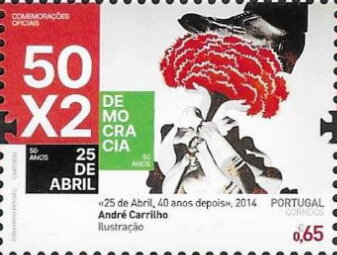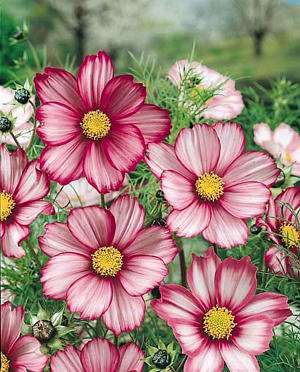Stamp: Revolution of 1974, 50 Years (Portugal 2024)
Revolution of 1974, 50 Years (Portugal 2024)
28 March (Portugal ) within release The Arts of 25 April goes into circulation Stamp Revolution of 1974, 50 Years face value 0.65 Euro
| Stamp Revolution of 1974, 50 Years in catalogues | |
|---|---|
| Afinsa-Mundifil: | Afi: PT 5624 |
| Colnect codes: | Col: PT 2024.03.28-01c |
Stamp is square format.
stamp from mini-sheetAlso in the issue The Arts of 25 April:
- Mini Sheet - Revolution of 1974, 50 Years face value 6*0.65;
- Stamp - Revolution of 1974, 50 Years face value 0.65;
- Stamp - Revolution of 1974, 50 Years face value 0.65;
- Stamp - Revolution of 1974, 50 Years face value 0.65;
- Stamp - Revolution of 1974, 50 Years face value 0.65;
- Stamp - Revolution of 1974, 50 Years face value 0.65;
- Stamp - Revolution of 1974, 50 Years face value 0.65;
Stamp Revolution of 1974, 50 Years it reflects the thematic directions:
An anniversary is the date on which an event took place or an institution was founded in a previous year, and may also refer to the commemoration or celebration of that event. For example, the first event is the initial occurrence or, if planned, the inaugural of the event. One year later would be the first anniversary of that event. The word was first used for Catholic feasts to commemorate saints. Most countries celebrate national anniversaries, typically called national days. These could be the date of independence of the nation or the adoption of a new constitution or form of government. The important dates in a sitting monarch's reign may also be commemorated, an event often referred to as a "Jubilee".
A flower, sometimes known as a bloom or blossom, is the reproductive structure found in plants that are floral (plants of the division Magnoliophyta, also called angiosperms). The biological function of a flower is to effect reproduction, usually by providing a mechanism for the union of sperm with eggs. Flowers may facilitate outcrossing (fusion of sperm and eggs from different individuals in a population) or allow selfing (fusion of sperm and egg from the same flower). Some flowers produce diaspores without fertilization (parthenocarpy). Flowers contain sporangia and are the site where gametophytes develop. Many flowers have evolved to be attractive to animals, so as to cause them to be vectors for the transfer of pollen. After fertilization, the ovary of the flower develops into fruit containing seeds. In addition to facilitating the reproduction of flowering plants, flowers have long been admired and used by humans to beautify their environment, and also as objects of romance, ritual, religion, medicine and as a source of food.


